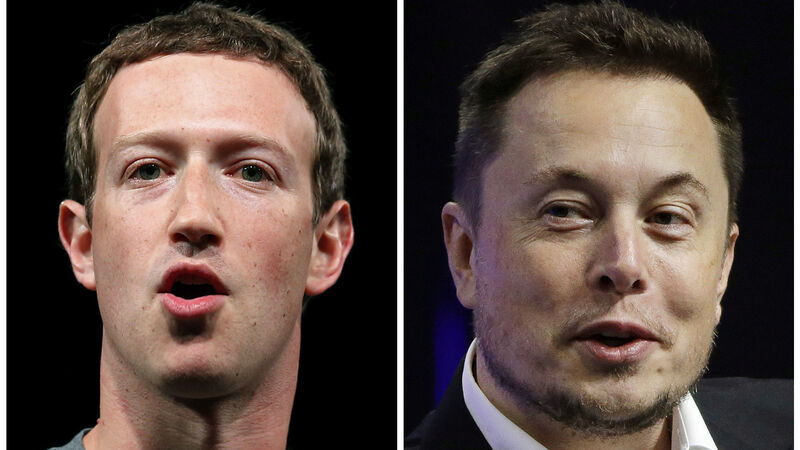Europe monitoring social media giants after Meta moves to halt fact-checking of US posts

Meta CEO Mark Zuckerberg, left, and X CEO Elon Musk. Mr Zuckerberg announced his platforms would be using an Community Notes system, as used on Mr Musk's X, where users flag content as false or misleading. File photo: AP/Manu Fernandez, Stephan Savoia
The European Commission appears to be on a collision course with the US over social media giants X and Meta, while the Irish regulator is set to engage with the latter on its drastic changes to content moderation policies announced this week.
With a Trump presidency looming, Meta boss Mark Zuckerberg announced his platforms would be ending third-party fact-checking on posts in the US and would instead switch to an X-style Community Notes system where users flag content as false or misleading.
Mr Zuckerberg said the decision was about "restoring free expression" on its platforms and "reducing mistakes", while the owner of Facebook, Instagram and Threads said fact-checkers had been influenced by their own biases with it amounting to censorship.
Incoming US President Donald Trump, who has already hinted at a potential trade war with Europe, said the move is “probably” because of his threats against the Meta boss.
It’s understood that authorities in Ireland and in Europe will be closely monitoring developments from Meta going forward.
Furthermore, indications are that the European Commission will be looking closely to see how soon Meta seeks to roll out its US changes across the Atlantic, which may provoke a reaction from Brussels.
Meta is already under investigation from the European Commission for alleged breaches of the Digital Services Act, and any reaction from the US to Europe’s attempts to hold social media giants to account is expected to be sharply monitored.
Irish regulator Coimisiún na Meán has said it will engage with Meta on its decision relating to community standards and the impact this will have on European users. However, it stressed that the compliance of online platforms like Facebook with elements of the Digital Services Act relating to risk assessment and mitigation falls within the competency of the European Commission.
A spokesperson said: “Coimisiún na Meán is engaged with Meta as part of our ongoing supervisory process to ensure compliance with the DSA. Meta’s statement in relation to its fact-checking programme indicates that it applies only to the United States currently and not to users within the European Union.”
Meanwhile, an Irish extremism watchdog described Mr Zuckerberg’s announcement as “deeply dangerous and disingenuous” and claimed Meta is trying to “escape democratic control”. Hope and Courage, which has presented to Oireachtas committees, claimed that Meta already “fuels misinformation, hate and violence” and that its toxic algorithms limit freedom of expression.
Hope and Courage executive director, Edel McGinley, said: “Algorithms take people down the river of hate, leaving truth and compassion to catch up.
“In the next programme for the government, it's time to turn off the toxic engagement-based recommender systems by default. Already, elected representatives are proposing protecting children and young people from digital harm.
“This is a good first step, and shows a recognition that these platforms can be dangerous if not properly regulated. But we need to do more.”
Furthermore, Meta’s decision comes after its most recent risk assessment report for the EU states that its fact-checking programme forms the basis of its efforts to "prevent the spread of large-scale misinformation and disinformation” on Facebook.
Its report, published last August, stated that in the period of just six months — July to December 2023 — it attached “fact-checking labels to over 68 million” pieces of content viewed in the EU on Facebook and Instagram globally.
The report said: “When a fact-checked label is placed on a post, 95% of people do not click to view it.”
It said disinformation is the promotion and distribution of false or misleading information with the “intention to deceive or secure economic and political gain” and includes the actions of “covert influence operations”, including by hostile parties or states.
The report, produced by Meta Platforms Ireland Limited, the provider of Facebook in the EU, said it had built the “largest fact-checking programme” across the industry in Europe, with 29 partners across the EU covering 23 languages.
“Our fact-checking programme forms the basis to prevent the spread of large-scale misinformation and disinformation and is capacity bound,” it said.
It said the policy is focused on fact-checking for “widespread hoaxes such as ‘climate change is not real’ and not every piece of content, as that is not feasible”.
It said AI-generated content was making this task increasingly challenging, but said Meta is “investing heavily” to adapt its detection and enforcement processes.
The report said misinformation (which is false but not intended to deceive) is more difficult to identify and deal with and is typically assessed by its independent fact-checkers for review. It said the fact-checkers can also identify content to review themselves.
“There is no society-wide consensus on what constitutes misinformation and how it should be addressed," the report said. "Meta’s approach to this is to rely on third-party fact-checkers who independently review and rate content.”
It said that even if the content does not violate its Community Standards the fact-checkers examine the accuracy and content and can still determine it as false and label accordingly.
Separately, French foreign minister Jean-Noël Barrot has hit out at X owner Elon Musk for his interference in European politics and said that France may call for powers from the European Commission to protect against “interference”.
Mr Musk has been a key ally of Trump in recent times, with experts suggesting that both his platform and now Meta are rowing in behind the new US president seeking his approval. Mr Musk has also made disparaging comments about UK and German leaders in recent times, and is set to host German far-right politician Alice Weidel in a livestream on X on Thursday.
Mr Barrot told French radio: “If the European Commission does not know how to protect us against this interference or these threats of interference then it must give member states, including France, the ability to protect itself.”
X is already subject to formal proceedings from the European Commission under the DSA. It has also brought a legal challenge against Ireland’s regulator over its Online Safety Code, which place obligations on platforms to keep users safe online.





